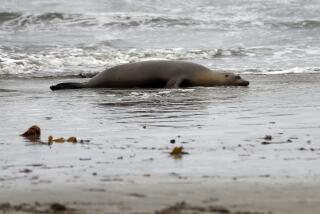Tentacles of Drought Have Long Reach
There isn’t a day that goes by that Gary Hitch doesn’t think about the squid.
As owner of Dave’s Marine Fuel at the Ventura Harbor, he’s watched his once hefty sales margin plummet as area seiners remain tied to their moorings, unable to scour the seas around the Channel Islands.
“This has been quite a year,” Hitch said. “This El Nino thing has taken a bite out of everybody.”
The loss of this year’s squid harvest has rippled through the industry, causing everyone connected with the fishery--from processors to truckers to fuel dock owners--to clutch their purse strings a little bit tighter.
Hitch, who said he’s relied on the money he’s saved over the past 10 years to see him through, estimates that he’s lost somewhere between 60% and 70% of the profits he would have earned during a normal year.
But the past year has been anything but normal.
According to industry and government estimates, the 1996-1997 squid season was the most bountiful in state history, with more than 257 million pounds netted off the coast of California during the six-month season.
But that number dwindled to practically nothing this year after the warm waters chased the catch away, leaving squid fishermen with nothing to do but wait.
“Not having a squid season has hit everyone pretty hard,” said Frank Bacchilega, manager of the Channel Islands Harbor Fuel Dock. “Let me tell you, it hurts when there’s nobody pulling in here getting 2,000, 3,000 or 4,000 gallons worth of fuel.”
But the economic damage left in the wake of El Nino has extended far beyond the harbor wharves.
Suncoast Calamari in Oxnard was forced to lay off almost 200 of its processors this season because of the loss of the squid harvest. The firm has remained virtually closed for the better part of nine months as it waits for the catch to return.
“We’re pretty much shut down right now, and we can’t do anything until we start to see some squid,” said plant foreman John Cordero. “It’s been hard, but if there’s no product, there’s not going to be any jobs.”
Terminal Freezers in Oxnard, which stores squid in its 410,000 square feet of freezer space before shipping it to such places as China and Europe, has also felt the pinch--even with other clients to rely on.
In a typical year, the company can expect to store between 25 million to 35 million pounds of squid, said plant manager John Brashear. But this year, the facility has only stored about 20,000 pounds of the mollusks.
“It’s definitely taken its toll, but we’re in a better position than other people because we have a lot of other accounts,” Brashear said. “But even with that, we’ve still had some tough times this year.”
For the cash-strapped Ventura Port District, the loss of the catch and the resulting losses to harbor businesses that cater to the fleet were the last thing the district needed.
Though the port receives a $2 fee for every ton of squid and other catches off-loaded at the harbor, district financial officer Ed Wohlenberg said it’s other harbor businesses such as fuel depots, restaurants and hotels that have been hurt the most.
“It’s that rippling effect that really matters,” he said. “Our whole future is tied to the economic success of others, so this is certainly something that concerns us.”
John Johnson, owner of the Ventura Harbor Boatyard, said he was forced to do something he hoped he would never have to: lay off workers during the holiday season. But with a cash-poor commercial fishing fleet unable to pay for boat repairs, that’s exactly what he did.
“We just didn’t have the work or the money, and when that happens you just have to start whacking away,” said Johnson, who laid off 10 of his skilled laborers. “Right now’s a bad time to be involved with this business, but we’re hoping it’ll get better.”
Yet it’s uncertain whether the industry will recover, even if the squid do return in October.
Commercial fishermen, many of whom are teetering on the brink of financial collapse, said they are finding it difficult to qualify for federal disaster loans made available to them in April.
And if they fail to find financing to help them stave off creditors, there may not be much of a fleet to maintain.
“This El Nino disaster goes far beyond just the fishermen; it’s affecting everybody who’s involved with the industry,” said Zeke Grader, executive director of the Pacific Federation of Commercial Fishermen’s Assns. “If the fleet fails, there’s going to be a lot of people out of work and a lot of hurting communities.”
So people like Hitch wait and hope the catch returns to again fill the boat holds.
“We’re just keeping our fingers crossed that this business picks up again soon,” Hitch said. “We’ll make it through, but it’s something that I’ve never experienced before, and I hope I never have to again.”
More to Read
Inside the business of entertainment
The Wide Shot brings you news, analysis and insights on everything from streaming wars to production — and what it all means for the future.
You may occasionally receive promotional content from the Los Angeles Times.










